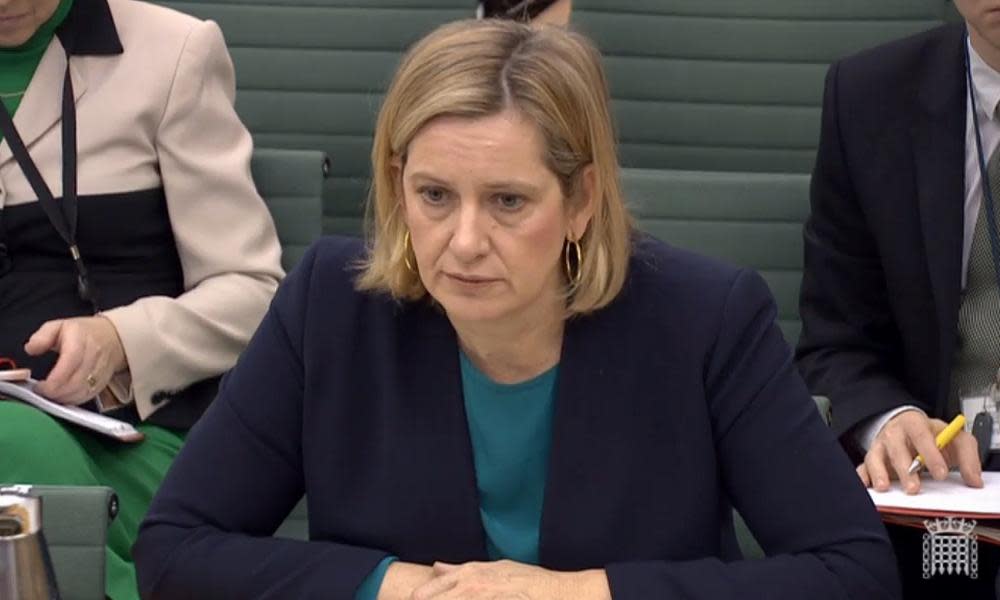Amber Rudd warns of further delays to universal credit

The work and pensions secretary, Amber Rudd, has signalled she would consider further policy changes and rollout delays to restore public confidence in universal credit, telling MPs her priority was to make it safe for vulnerable claimants.
Rudd, who has been in the post for four weeks, struck a conciliatory tone in her first appearance before the work and pensions select committee, saying she was enthusiastic about universal credit but would not rush the rollout of the new system simply to meet arbitrary timetables.
She would look again at other controversial aspects of welfare reform, including the two-child benefits limit and the ongoing four-year freeze in benefit levels – although she warned changes might be difficult where there was a financial impact on the Treasury.
“I’m enthusiastic about universal credit and I do think we can get it right. I acknowledge it is not just tinkering; there have been problems. I see that as the biggest change I have got, to fix those problems and give people the confidence to believe that universal credit is going to help them in their lives,” she said.
Responding to MPs’ concerns that up to 1 million ill and disabled claimants are at risk of destitution and isolation when they are transferred on to universal credit over the next three years, Rudd said she wanted to ensure the most vulnerable were safely moved on to the system in a safe way.
“The priority for me is making sure we get it right … We have particular concerns about … the most vulnerable in society and some of them will take a long time to get on to universal credit in terms of engaging with them and getting the transfers done effectively. We will learn and see how long we need in order to ensure it is effective.
“I would much rather every individual gets the personal attention and care getting on to universal credit than sticking to a prescribed timetable.”
She also promised to look at ways to minimise the risk of benefit payments – currently paid to one member of the household – being used by domestic abusers to exert power over their partner by seizing control of the family income.
Universal credit, which rolls six working-age benefits into one monthly payment, has proved politically toxic for the government in recent years as a result of policy and design flaws such as a five-week wait for an initial payment that have left thousands of claimants in debt, suffering from depression, and reliant on food banks.
Pressed by MPs on claimants’ use of charity food parcels, Rudd – whose Hastings constituency recorded an 80% rise in food bank use after universal credit was rolled out in 2016 – said she acknowledged it was an issue, saying: “I do not want people to have to go to food banks.”
There are about 1.4 million people on universal credit but this will increase rapidly over the next three years as millions of existing claimants, including recipients of working tax credits and disability benefits, are transferred on to the new system, a process known as “managed migration”.
Rudd told the committee that regulations governing managed migration – originally expected in October – would not be debated in parliament until the new year. Campaigners, MPs and the Department for Work and Pensions’ own advisory committee have called for more safeguards to protect vulnerable claimants.
Asked whether universal credit was stable enough to be expanded further under managed migration, Rudd admitted the government was not always as good as it should be at rolling out changes.
She added: “It is coping but we are only at the foothills in some respects … So I hope we will make steady, careful steps, checking all the time as we embark on this ambitious programme.”
Rudd’s comments suggest the government is prepared if necessary to further delay the rollout of the new benefit. It is running six years behind schedule, with the last of an estimated 7 million claimants not due to move on to the system until the end of 2023.
“The biggest risk is making sure that universal credit as it is rolled out does so in a safe way that gives people confidence that it has been,” she told MPs

 Yahoo News
Yahoo News 
